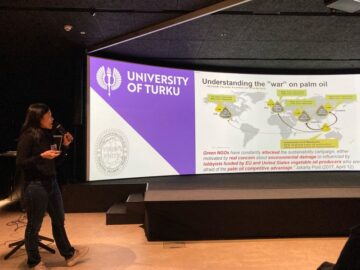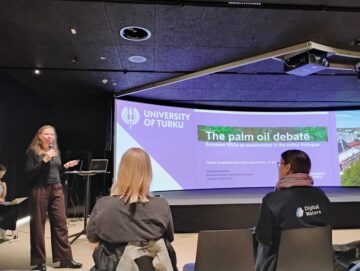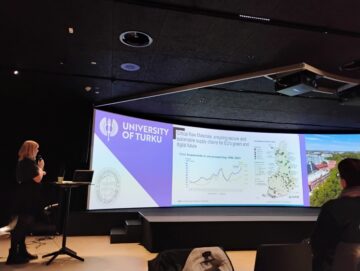Finnish Geography Days 2024 (30-31.10.2024)
The Geography Days session Natural Resources and Environmental Policies took place on Thursday 31 Oct 2024 at 1-2:15 pm in University of Turku JOKI Center, with Johanna Leino of the University of Eastern Finland and Ayu Pratiwi co-chairing the session. The session focused on justice and power contestation in natural resource management, governance, and the role of stakeholders in shaping policies.
The summary of the presentations is as follow:

– Ayu Pratiwi (University of Turku): Stakeholders’ interest, networks and power in Indonesian palm oil governance and responses to EU Deforestation Regulation. This presentation explores stakeholders’ interest and power dynamics in Indonesian palm oil policy and governance in response to the EU Deforestation Regulation (EUDR) 2023/1115, which will take effect in late 2024. Pratiwi conducted in-depth interviews with 27 stakeholder actors and identified their ties to approximately 140 actors involved in palm oil governance in Indonesia. A social network analysis (SNA) is performed to understand the power contestation and bargaining between actors. The preliminary results show that, despite smallholders being central to the EUDR controversy, they are placed in the periphery of the networks, having the lowest bargaining power. Corporate actors serve as the bridging ties connecting them to national governance.

– Erja Kettunen-Matilainen (University of Turku): The palm oil debate: European NGOs as stakeholders in the policy dialogue. Public debate in Europe has raised concerns about the effects of oil palm monoculture farming in Indonesia on deforestation, biodiversity loss, and violations on the environment, human rights and indigenous land rights. Kettunen focuses on the opinions of European NGOs in the context of the multi-scalar debate among the various stakeholders and draws on data from NGO publications and online news. The findings indicate that 1) opinions on palm oil voiced by European NGOs – such as Friends of the Earth Europe, WWF Europe and Climate Action Network Europe – focus on pushing for the EU Deforestation Regulation; and, 2) international NGOs, such as Rainforest Rescue and Grassroots, push for the improvement of sustainability standards of the international Roundtable for Sustainable Palm Oil, in particular.
– Tiina Järvi (University of Tampere): Breathing the atmospheres of failure: generators, pollution and negligence in Beirut. Järvi’s presentation focuses on the embodied failure(s) of Lebanon’s electricity infrastructure. Destroyed through intentional and disproportionate targeting (by Israel, the so-called ‘Dahiya doctrine’) as well as chronically neglected, the electricity failure is a clear manifestation of corruption, geopolitics, waste networks, and economic profiteering that inhibit reform in Lebanon. The study considers how the rising pollution levels constitute an atmospheric manifestation of failure that is not only embodied via breathing but also shows the need to think of failure as a lived material condition.

– Johanna Leino (University of Eastern Finland): Understanding multiscalar justice claims, accelerating a just transition – an example of contested critical minerals. Leino aims to uncover tensions and contradictions between justice claims within the context of low-carbon transitions and the growing demand for critical minerals. The study therefore explores justice claims mobilized in Finland’s Mining Act reform process in 2021—2023, revealing the multiscalar complexities of justice claims made by various stakeholders. Based on qualitative content analysis documents and interview data, the findings highlight that stakeholders mobilize justice claims on micro, meso, and macro scales, thus creating tension around perceived justice in transition.
All abstracts are available here: https://sites.utu.fi/maantieteenpaivat2024/wp-content/uploads/sites/1337/2024/10/abstraktivihko_paivitetty_to2410.pdf